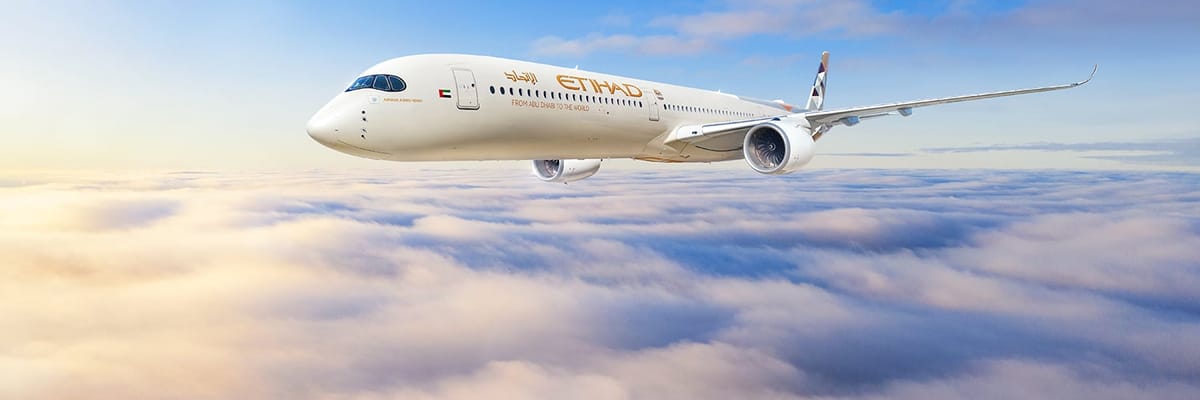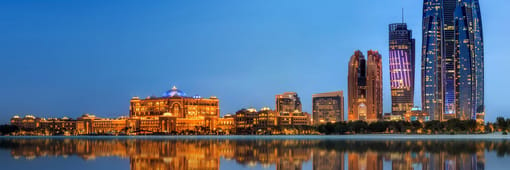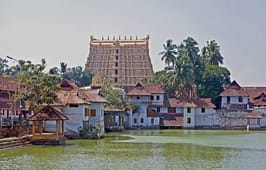
International flight fares from GBP413
Our Most Popular International Flight Tickets
flight_takeoff
flight_land
*Fares displayed have been collected within the last 48hrs and may no longer be available at time of booking. Additional fees and charges for optional products and services may apply.

Flight Deals for Popular International Routes on Etihad
flight_takeoff
flight_land
From | To | Fare Type | Dates | Price | |
|---|---|---|---|---|---|
| London (LHR) | Abu Dhabi (AUH) | Round-trip / Economy | 6 Nov 2025 - 24 Nov 2025 | From GBP506 Last Seen 1 day ago | |
| London (LHR) | Abu Dhabi (AUH) | Round-trip / Economy | 18 Sep 2025 - 25 Sep 2025 | From GBP528 Last Seen 22 hours ago | |
| London (LHR) | Abu Dhabi (AUH) | Round-trip / Economy | 25 Sep 2025 - 2 Oct 2025 | From GBP528 Last Seen 22 hours ago | |
| London (LHR) | Abu Dhabi (AUH) | Round-trip / Economy | 25 Aug 2025 - 8 Sep 2025 | From GBP528 Last Seen 22 hours ago | |
| London (LHR) | Abu Dhabi (AUH) | Round-trip / Economy | 4 Sep 2025 - 18 Sep 2025 | From GBP528 Last Seen 22 hours ago | |
| London (LHR) | Abu Dhabi (AUH) | Round-trip / Economy | 15 Sep 2025 - 29 Sep 2025 | From GBP528 Last Seen 22 hours ago | |
| London (LHR) | Abu Dhabi (AUH) | Round-trip / Economy | 17 Sep 2025 - 1 Oct 2025 | From GBP528 Last Seen 22 hours ago | |
| London (LHR) | Abu Dhabi (AUH) | Round-trip / Economy | 23 Sep 2025 - 7 Oct 2025 | From GBP528 Last Seen 22 hours ago | |
| London (LHR) | Abu Dhabi (AUH) | Round-trip / Economy | 28 Aug 2025 - 11 Sep 2025 | From GBP528 Last Seen 22 hours ago | |
| London (LHR) | Abu Dhabi (AUH) | Round-trip / Economy | 8 Sep 2025 - 22 Sep 2025 | From GBP528 Last Seen 22 hours ago | |
| London (LHR) | Bangkok (BKK) | Round-trip / Economy | 18 Sep 2025 - 25 Sep 2025 | From GBP540 Last Seen 5 hours ago | |
| London (LHR) | Bangkok (BKK) | Round-trip / Economy | 28 Aug 2025 - 11 Sep 2025 | From GBP540 Last Seen 5 hours ago | |
| London (LHR) | Bangkok (BKK) | Round-trip / Economy | 18 Sep 2025 - 2 Oct 2025 | From GBP540 Last Seen 5 hours ago | |
| London (LHR) | Bangkok (BKK) | Round-trip / Economy | 25 Sep 2025 - 9 Oct 2025 | From GBP540 Last Seen 5 hours ago | |
| London (LHR) | Bangkok (BKK) | Round-trip / Economy | 4 Sep 2025 - 11 Sep 2025 | From GBP540 Last Seen 5 hours ago | |
| London (LHR) | Bangkok (BKK) | Round-trip / Economy | 24 Sep 2025 - 1 Oct 2025 | From GBP540 Last Seen 5 hours ago | |
| London (LHR) | Bangkok (BKK) | Round-trip / Economy | 30 Sep 2025 - 7 Oct 2025 | From GBP540 Last Seen 5 hours ago | |
| London (LHR) | Bangkok (BKK) | Round-trip / Economy | 2 Oct 2025 - 9 Oct 2025 | From GBP540 Last Seen 5 hours ago | |
| London (LHR) | Bangkok (BKK) | Round-trip / Economy | 24 Sep 2025 - 29 Sep 2025 | From GBP540 Last Seen 5 hours ago | |
| London (LHR) | Bangkok (BKK) | Round-trip / Economy | 2 Oct 2025 - 7 Oct 2025 | From GBP540 Last Seen 5 hours ago |
*Fares displayed have been collected within the last 48hrs and may no longer be available at time of booking. Additional fees and charges for optional products and services may apply.
Popular flights from Etihad
- Manchester to Jeddah flights
- Manchester to Riyadh flights
- Manchester to Dammam flights
- Manchester to Phuket flights
- Manchester to Krabi flights
- Manchester to Chiang Mai flights
- Manchester to Lahore flights
- Manchester to Karachi flights
- Manchester to Islamabad flights
- Manchester to Medan flights
- Manchester to Colombo flights
- Manchester to Thiruvananthapuram flights
- Manchester to Chennai flights
- Manchester to Kozhikode flights
- Manchester to Jaipur flights

















